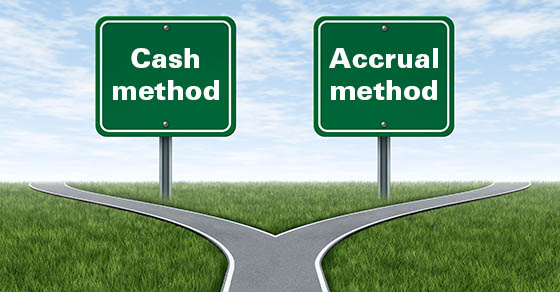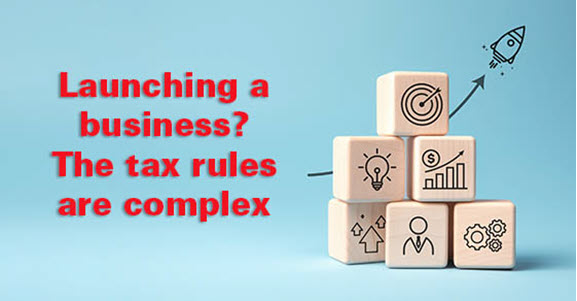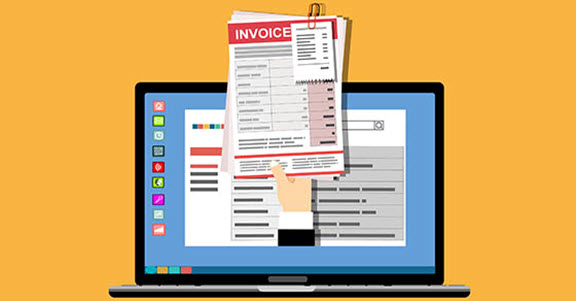Businesses basically have two accounting methods to figure their taxable income: cash and accrual. Many businesses have a choice of which method to use for tax purposes. The cash method often provides significant tax benefits for eligible businesses, though some may be better off using the accrual method. Thus, it may be prudent for your business to evaluate its method to ensure that it’s the most advantageous approach.
Eligibility to use the cash method
“Small businesses,” as defined by the tax code, are generally eligible to use either cash or accrual accounting for tax purposes. (Some businesses may also be eligible to use various hybrid approaches.) Before the Tax Cuts and Jobs Act (TCJA) took effect, the gross receipts threshold for classification as a small business varied from $1 million to $10 million depending on how a business was structured, its industry and factors involving inventory.
The TCJA simplified the small business definition by establishing a single gross receipts threshold. It also increased the threshold to $25 million (adjusted for inflation), expanding the benefits of small business status to more companies. For 2024, a small business is one whose average annual gross receipts for the three-year period ending before the 2024 tax year are $30 million or less (up from $29 million for 2023).
In addition to eligibility for the cash accounting method, small businesses can benefit from advantages including:
- Simplified inventory accounting,
- An exemption from the uniform capitalization rules, and
- An exemption from the business interest deduction limit.
Note: Some businesses are eligible for cash accounting even if their gross receipts are above the threshold, including S corporations, partnerships without C corporation partners, farming businesses and certain personal service corporations. Tax shelters are ineligible for the cash method, regardless of size.
Difference between the methods
For most businesses, the cash method provides significant tax advantages. Because cash-basis businesses recognize income when received and deduct expenses when they’re paid, they have greater control over the timing of income and deductions. For example, toward the end of the year, they can defer income by delaying invoices until the following tax year or shift deductions into the current year by accelerating the payment of expenses.
In contrast, accrual-basis businesses recognize income when earned and deduct expenses when incurred, without regard to the timing of cash receipts or payments. Therefore, they have little flexibility to time the recognition of income or expenses for tax purposes.
The cash method also provides cash flow benefits. Because income is taxed in the year received, it helps ensure that a business has the funds needed to pay its tax bill.
However, for some businesses, the accrual method may be preferable. For instance, if a company’s accrued income tends to be lower than its accrued expenses, the accrual method may result in lower tax liability. Other potential advantages of the accrual method include the ability to deduct year-end bonuses paid within the first 2½ months of the following tax year and the option to defer taxes on certain advance payments.
Switching methods
Even if your business would benefit by switching from the accrual method to the cash method, or vice versa, it’s important to consider the administrative costs involved in a change. For example, if your business prepares its financial statements in accordance with U.S. Generally Accepted Accounting Principles, it’s required to use the accrual method for financial reporting purposes. That doesn’t mean it can’t use the cash method for tax purposes, but it would require maintaining two sets of books.
Changing accounting methods for tax purposes also may require IRS approval. Contact us to learn more about each method.
© 2024
Q&As
What are the main differences between the cash and accrual accounting methods?
The main differences between the cash and accrual accounting methods lie in how income and expenses are recorded and recognized. Under the cash accounting method, revenue is recognized when cash is received from customers, and expenses are recognized when cash is paid to suppliers or other parties. This method focuses on actual cash inflows and outflows. On the other hand, the accrual accounting method records revenue when it is earned, regardless of when payment is received, and expenses are recorded when they are incurred, regardless of when payment is made. This method matches revenues with their associated expenses, providing a more accurate picture of a company’s financial performance.
Which accounting method—cash or accrual basis—provides better tax advantages for businesses?
For most businesses, the cash method provides significant tax advantages. Because cash-basis businesses recognize income when received and deduct expenses when they’re paid, they have greater control over the timing of income and deductions. The cash method also provides cash flow benefits. Because income is taxed in the year received, it helps ensure that a business has the funds needed to pay its tax bill. However, for some businesses, the accrual method may be preferable. For instance, if a company’s accrued income tends to be lower than its accrued expenses, the accrual method may result in lower tax liability. Other potential advantages of the accrual method include the ability to deduct year-end bonuses paid within the first 2½ months of the following tax year and the option to defer taxes on certain advance payments.
What types of businesses are eligible to use the cash method for tax purposes?
Generally, businesses with average annual gross receipts of $30 million or less for the three-year period ending before the 2024 tax year are eligible to use the cash method. Some businesses are eligible for cash accounting even if their gross receipts are above the threshold, including S corporations, partnerships without C corporation partners, farming businesses and certain personal service corporations.
Can my business switch between the cash and accrual method?
Yes, businesses can switch between the cash and accrual method of accounting. However, it is important to note that once a business chooses a method for tax purposes, it generally must obtain permission from the IRS to change methods. The IRS has specific rules and procedures for changing accounting methods, and businesses should consult with a tax professional or accountant to ensure compliance with these regulations. Additionally, switching between methods may have implications for financial reporting and may require adjustments to be made to prior period financial statements. It is recommended to carefully consider the benefits and drawbacks of each method before making a decision to switch.






